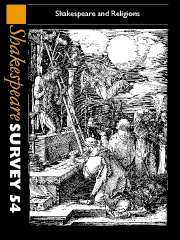Book contents
- Frontmatter
- Shakespeare and the Protestant Mind
- Divine [ ]sences
- ‘An alien people clutching their Gods’?: Shakespeare’s Ancient Religions
- ‘He drew the Liturgy, and framed the rites’: The Changing Role of Religious Disposition in Shakespeare's Reception
- Jonson, Shakespeare, and the Religion of Players
- The Bard and Ireland: Shakespeare’s Protestantism as Politics in Disguise
- ‘Every Good Gift From Above’ Archbishop Trench’s Tercentenary Sermon
- Anthony Munday and The Merchant of Venice
- Perfect Answers: Religious Inquisition, Falstaffian Wit
- When Suicide Becomes an Act of Honour: Julius Caesar and Hamlet in Late Nineteenth-Century Japan
- Religion in Arden
- A Wedding and Four Funerals: Conjunction and Commemoration in Hamlet
- Between Religion and Ideology: Some Russian Hamlets of the Twentieth Century
- Of Shadows and Stones: Revering and Translating ‘the Word’ Shakespeare in Mexico
- Ministers, Magistrates and the Production of ‘Order’ in Measure for Measure
- The Hebrew Who Turned Christian: The First Translator of Shakespeare into the Holy Tongue
- Shakespeare and English Performance Style: The European Context
- All At Sea: Water, Syntax, and Character Dissolution in Shakespeare
- King John, König Johann: War and Peace
- The Tempest’s Forgotten Exile
- The Old Lady, or All is Not True
- Shakespeare Performances in England, 2000
- Professional Shakespeare Productions in the British Isles January-December 1999
- The Year's Contributions to Shakespearian Study 1 Critical Studies
- 2 Shakespeare’s Life, Times, and Stage
- 3 Editions and Textual Studies
- Books Received
- Index
Between Religion and Ideology: Some Russian Hamlets of the Twentieth Century
Published online by Cambridge University Press: 28 March 2007
- Frontmatter
- Shakespeare and the Protestant Mind
- Divine [ ]sences
- ‘An alien people clutching their Gods’?: Shakespeare’s Ancient Religions
- ‘He drew the Liturgy, and framed the rites’: The Changing Role of Religious Disposition in Shakespeare's Reception
- Jonson, Shakespeare, and the Religion of Players
- The Bard and Ireland: Shakespeare’s Protestantism as Politics in Disguise
- ‘Every Good Gift From Above’ Archbishop Trench’s Tercentenary Sermon
- Anthony Munday and The Merchant of Venice
- Perfect Answers: Religious Inquisition, Falstaffian Wit
- When Suicide Becomes an Act of Honour: Julius Caesar and Hamlet in Late Nineteenth-Century Japan
- Religion in Arden
- A Wedding and Four Funerals: Conjunction and Commemoration in Hamlet
- Between Religion and Ideology: Some Russian Hamlets of the Twentieth Century
- Of Shadows and Stones: Revering and Translating ‘the Word’ Shakespeare in Mexico
- Ministers, Magistrates and the Production of ‘Order’ in Measure for Measure
- The Hebrew Who Turned Christian: The First Translator of Shakespeare into the Holy Tongue
- Shakespeare and English Performance Style: The European Context
- All At Sea: Water, Syntax, and Character Dissolution in Shakespeare
- King John, König Johann: War and Peace
- The Tempest’s Forgotten Exile
- The Old Lady, or All is Not True
- Shakespeare Performances in England, 2000
- Professional Shakespeare Productions in the British Isles January-December 1999
- The Year's Contributions to Shakespearian Study 1 Critical Studies
- 2 Shakespeare’s Life, Times, and Stage
- 3 Editions and Textual Studies
- Books Received
- Index
Summary
In 1911, looking back at an epoch, which had come to an end with Leo Tolstoy’s death, and forward, to an already palpable time of change, the philosopher, critic and poet Vyacheslav Ivanov wrote:
From the religious and moral point of view we can distinguish three types of cultural attitudes: the relativist, the ascetic and the symbolic. The first denies the religious basis of culture as a system of relative values. The second (to which Tolstoy belongs), lays bare the moral and religious basis of cultural work, denies all derivative, symbolic or irrational cultural values; it inevitably subjects the instinctive, the playful, the artistic to moral utilitarianism ... identifies the necessary with the useful and the morally correct. The third attitude to culture is according to us the only sound and correct one ... It lies on the heroic and tragic path of liberating the world soul. Those committed to it have sworn ... to turn the inherited legacy of human culture into a symbolism underpinning all spiritual values, and to relate them to the hierarchies of the divine world, to justify the relativity of human art through its symbolic correlation with the absolute. In other words, the task is to bring all culture, and together with it, nature, into a Church mystical, the principles of whose creation coincide with those of the Creation itself.
Ivanov's tri-partite typology profoundly reflects the state of the cultural debate in Russia at the turn of the twentieth century in circumstances of dramatic transition. The mighty imperial structure was unwillingly giving under the social pressures urging for democratization. The century began with student unrest and activities of leftist organizations. While the European fringe of the Empire was strengthened by counterproductive russification policies, the frontier in the Far East was crumbling.
- Type
- Chapter
- Information
- Shakespeare Survey , pp. 140 - 151Publisher: Cambridge University PressPrint publication year: 2001
- 1
- Cited by

